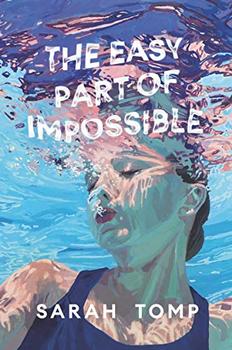Summary | Excerpt | Reviews | Beyond the book | Read-Alikes | Genres & Themes | Author Bio

After nearly half a decade of waiting, bestselling author John Green is back and better than ever with Turtles All the Way Down. This intensely readable young adult novel features Aza Holmes—an introspective, nervous 16-year-old girl struggling with obsessive-compulsive disorder.
The plot kicks off almost immediately with news that local Indianapolis billionaire Russell Pickett (and father of Aza's former friend, Davis) has gone on the run after accusations of rampant fraud and corruption. Any information leading to his capture will be rewarded with the grand sum of $100,000. Aza has long since drifted away from Davis, but her best friend Daisy insists that Aza use her personal history with Davis to wrench insider information on Russell's whereabouts. Daisy eventually moves on, but Aza just can't seem to let it go. The mystery of Russell Pickett lingers over her. Meanwhile, her mental health spirals downwards, affecting her relationships with Daisy and Davis, and most importantly, with herself.
Anyone who has read Green's most famous novel, The Fault in Our Stars, will be expecting poignant scenes and weighty issues, but Turtles All the Way Down goes further than just discussing complex topics – it embodies them. Written in first person, Green's writing definitely shows, not tells, with the narrative bordering on stream-of-consciousness at times. Aza is forever anxious about a wound on her finger, which she never lets heal, obsessively picking at and then disinfecting it, and terrified that she will develop a rare disease called Clostridium difficile. Even though Aza understands that she should take her medicine and stop picking at her finger – she simply can't. As she puts it, "I feel like a noose is tightening around me and I want out, but struggling only cinches the knot. The spiral just keeps tightening, you know?"
Aza's internal anxieties and compulsive tendencies continue to be overwhelming, with the first-person narrative giving the impression that the reader is also trapped within Aza's mind. While Green prefers not to speak about his specific compulsions, it is clear that his personal experiences with OCD offer keen insights into the mental health issue that feel perceptive, thoughtful, and full of emotion (see Beyond the Book).
While all Green's six novels (including one co-authored with David Levithan) have explored issues of substance, he has always included at least a hint of romance. Turtles All the Way Down both meets and defies the expectation of an epic love story. We know that there will be some sort of romantic relationship between Davis and Aza. On the other hand, Green handles the love arc much more realistically than his other, somewhat sappy, sentimental stories. Does it still have hints of sickly sweet love where boy and girl are drawn together mysteriously and almost immediately? Perhaps. But overall, Davis and Aza's interactions are punctuated with a set of dichotomies – between pragmatism and romanticism; hope and despair; uncertainty and intensity. Aza may love Davis, she may not; she wants to kiss him, her OCD warns of the thousands of germs exchanged by saliva; Davis needs someone desperately, but is Aza the one he needs?
This relationship certainly caught my interest, but it was the one between Daisy and Aza that I enjoyed the most. As a character, Aza is complex, and Daisy knows that. We can tell that Daisy loves Aza, even as Aza exhausts her with her constant worrying. Aza is her best friend and her partner-in-crime, but at the same time, Daisy points out that Aza's self-absorption can box her friends out at times. We do get the sense that while Daisy can't quite understand Aza's OCD, Aza also can't relate to Daisy's position as someone growing up in poverty. The love and resentment between the two young women adds an extra dimension to Turtles All the Way Down.
While I've always enjoyed John Green's novels for smart (but not pretentious) writing and the natural vitality of his voice, Turtles All the Way Down is the first of his books where I felt his characters rise out of the pages to become their own complex, real-life people. Anyone who has enjoyed Green before will definitely find a new favorite here and even those who are on the fence about him may find new intricacies and nuance to his storytelling in Turtles.
![]() This review was originally published in The BookBrowse Review in November 2017, and has been updated for the
July 2019 edition.
Click here to go to this issue.
This review was originally published in The BookBrowse Review in November 2017, and has been updated for the
July 2019 edition.
Click here to go to this issue.

If you liked Turtles All the Way Down, try these:

by Jeff Garvin
Published 2021
A quirky and heartfelt coming-of-age story about a teen girl with bipolar II who signs her failed magician father up to perform his legendary but failed illusion on live TV in order to make enough money to pay for the medications they need - from the author of Symptoms of Being Human. Perfect for fans of Adi Alsaid, David Arnold, and Arvin Ahmadi.

by Sarah Tomp
Published 2021
After an injury forces Ria off the diving team, an unexpected friendship with Cotton, a guy on the autism spectrum, helps her come to terms with the abusive relationship she's been in with her former coach.
Your guide toexceptional books
BookBrowse seeks out and recommends the best in contemporary fiction and nonfiction—books that not only engage and entertain but also deepen our understanding of ourselves and the world around us.